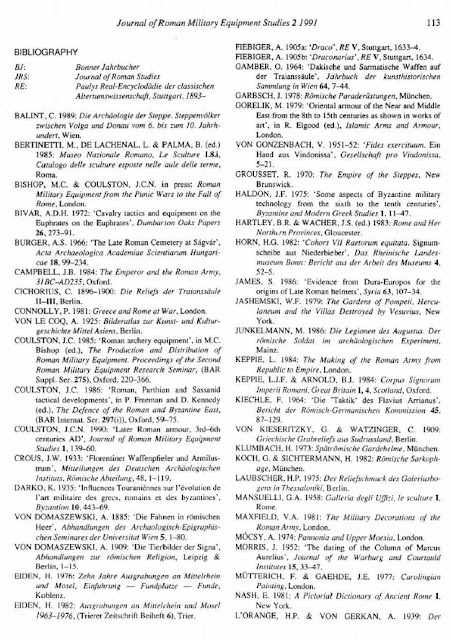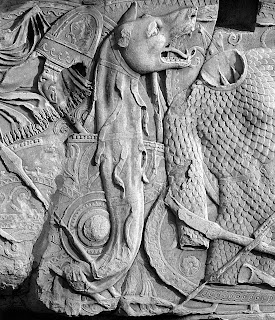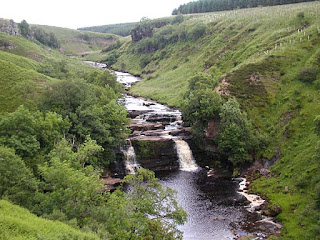Recreated Roman Gatehouse at Arbeia/South Shields
There is yet one more Wall fort to which Arthur may be linked: that of South Shields (Roman Arbeia, British Lugudunum). A god named Alator was worshiped there (https://romaninscriptionsofbritain.org/inscriptions/1055), and an early Welsh poem refers to Arthur as a symbolic descendant of this deity (Green, Caitlin, A Note on Aladur, Alator and Arthur, Celtica, Volume 41, Number 1, March 2007, pp. 229-241.). Two things are interesting about the South Shields fort. First, it on the extreme eastern end of the Wall, while most of the other Arthurian sites are clustered on the west end. This might suggest that Arthur was thought to control the entire length of the Wall. And, second, the name of the man who dedicated the altar to Alator at South Shields is Celsus. Latin Celsus means high or lofty. Uther, the name of Arthur's father, originally meant the same thing (Koch, J., ed., Celtic Culture: A Historical Encyclopedia, ABC-CLIO, 2006, p. 1722.).
For the current thinking on Alator, the following was excerpted from pp. 482-485 of
http://etheses.dur.ac.uk/6643/2/6643_3946-vol2.PDF:
From
South Shields comes an altar dedicated 'to Mars Alator' (RIB 1055) by
C.Vinicius Celsus 'prose et suis' 'for himself and his family'. Only one other
dedication to this god is known. This is on a silver plaque depicting Mars and
inscribed 'to the god Mars Alator Dum(nonius)? Censorinus son of Gemellus
willingly and deservedly
paid his vow' (RIB 218). The plaque was part of a hoard comprising a bronze
statuette of Mars and six other silver plaques and a bronze patera handle.
These came from Rookey Wood near Barkway, Herts., and presumably originated
from a shrine. Of the six silver plaques, three depict Mars but are
uninscribed, two depict Vulcanus, but only one of these is inscribed 'to the
deity V(o)lc(anus) 1 (RIB 220) and one is inscribed 'to Mars Toutates' but unfigured
(RIB 219). Two Celtic divine names are present here,
Alator and Toutates and it is clear that the Mars figurine and other
Mars-figured plaques must conceal a Celtic deity or deities. Whether a single
Celtic god with different names or epithets is present or not is open to further
discussion. Vulcanus no doubt stands for a Celtic Smith-God. In seeking to
establish the nature of Alator, the meaning of the name may be appealed too.
There are two possibilities available. One meaning is 'the hunter' (Holder,
1907, 75) whilst the other is 'he who rears or nourishes', 'The Nourisher'
(Ross, 1967, 174, 377). In the first case a god of the countryside would be in question,
a 'hunter-god'. The second meaning is suggestive of a deity concerned with
fertility and fruitfulness. Ross states that Alator was 'invoked primarily in
his warrior capacity' (1967, 174). Presumably
this conclusion is based on the fact that he is equated with Mars but that in
itself is an unsafe guide, bearing in mind the variety of roles that
Mars-equated Gallic deities can possess (Lambrechts, 1942, 147-8; Thevenot,
1955, 127-128). Whichever of the two possible meanings
of the deity name is favoured, neither would seem to indicate an emphasis on
the war-like aspect of Alator. The formula 'pro se et suis' on the South
Shields altar suggests a protector god. If at Barkway Alator refers to the same
deity as Toutates, then the meaning of the latter word comes into play, that is
'god of the people' (Holder, 1907 ~ 1805; Ross~ 196 7 ~ 171). Such a
designation marks the deity out as a tribal one. The all-purpose nature of such
a god would help to account for the Mars equation for Mars was himself 'Mars
Pater', 'Father of the Roman People' (Fink et al 1940~ 59; cf. RIB 1901). Even
if, however, the Toutates name should not be applied to Alator the indications
that remain do not strongly favour the interpretation of Dr. Ross. Mars Alator
was a protector god of the family and perhaps of the community who either nourished
his people and aided their fertility or else represented them as a hunter. It
is difficult to decide whether the South Shields altar represents the personal
dedication of a visitor, perhaps a trader from outside the region who had
brought knowledge of the god with him or whether his dedication means that the
cult was flourishing there already. The present writer has suggested elsewhere (Fairless,
1966, 290) that the cult of Alator flourished near Barkway and that the dedication
at South Shields represented an import from beyond the region. The former
presence of a shrine near Barkway is virtually certain while the altar from
South Shields seems isolated. However, reconsideration brings less
confidence and failing more evidence there can be no certainty in the matter.
NOTE: The Welsh sources substitute Aldwr for Geoffrey of Monmouth's Aldroenus of Brittany. The question is whether Aladwr should be properly traced the the god Alator or whether Aladwr is merely an error for Aldwr/Aldroenus. Or was the god name at some point wrongly related to Aldwr/Aldroenus? The latter was a fairly late medieval name Geoffrey doubtless plucked from some Breton chronicle or saint's vita. What follows are selections on Aldwr and Aldroenus from three respectable sources.
From P.C. Bartram's A CLASSICAL WELSH DICTIONARY:
ALDROENUS. See Aldwr.
ALDWR (Aldroenus). (Fictitious). (415) According to HRB VI.4 Aldroenus was a king of Armorica, the fourth from Conan Meriadoc, to whom Guetelinus, Bishop of London, came, offering him the kingdom of Britain if he would aid in repelling the Picts and Scots. Aldroenus declined the offer but sent his brother, Constantinus (see Custennin Fendigaid). In Brut y Brenhinedd the name becomes Aldwr. Being the brother of Custennin Fendigaid he was given the same pedigree, that is, Aldwr brenin Llydaw ap Kynfor ap Tudwal, etc. (Peniarth MS.181 p.58, mid 16th century). Compare MG 5, ByA 30 in EWGT pp.39, 93. The old Breton historians accepted HRB for the fictitious early kings of Armorica. The ‘Chronicle of St.Brieuc’ calls him Audroenus. Iste fecit castrum Audroeni prope Guingampum. (Dom Pierre Hyacinthe Morice, Mémoires pour servir de Preuves ... Vol.I, Paris, 1742, Col.9 - 10). Châtelaudren is a small village between St.Brieuc and Guingamp.
From http://christophergwinn.com/arthuriana/arthurs-pedigree/:
It is possible that the subject of the poem, the Teyrnon (“great lord”), who is said to be “of the lineage of Aladur” (o echen Aladur), may be Arthur (who is mentioned in one section of the poem). The identity of Aladur is a mystery, though he may be commemorated in the Welsh place names Coedladur and Nant-Ladur. It has been proposed that Aladur might be a Welsh survival of the Brittonic god Alator(ius), who was identified with Mars. It may be significant that the Welsh Brutiau substitute the name Aldwr for Geoffrey’s unfamiliar Breton name Aldroenus (uncle of Uther Pendragon)
...Aldroen (Old Breton Altroen) son of Salomon was accepted as a 5th century king of Brittany by late medieval and early modern Breton historians (Salomon is stated to have reigned after Grallon [or vice-versa], who succeeded Conan Meriadoc), but sources mentioning him prior to Geoffrey’s HRB are lacking. [However, the was a late 8th/early 9th century Breton Altroen who may have been the model for Geoffrey's character. See the pdf document cited below.] In later Breton histories he is stated to be the eponymous founder of the Breton town of Châtelaudren, former capital of the province Goello (in the Chronicon Briocense we read “Audroenus rex quartus a Conano fuit; iste fecit castrum Audroeni prope Guingampum”; the town is called called Castellum Audroeni in a charter dating to 1148 concerning the church of Saint Mary of Lanleff and Castrum Audrini in a charter from 1181; the fortress’ foundation dates to the 11th century). In a charter concerning Ploucasnou (OBr Ploicathnou) dating to 1061 and ascribed to Bertha de Blois (daughter of Odo II Count of Blois and wife of Alan III Duke of Brittany) and her son Conan II Duke of Brittany (brother of Hawise Duchess of Brittany, wife of Hoel II Duke of Brittany, who were the parents of Alan IV Fergant Duke of Brittany), mention is made of a witness named Pontius (or Poncius) son of Aldro(e)nus; he is likely the same person as Eudo Pontius, mentioned in the Lanleff charter above in connection with Castellum Audroeni. André-Yves Bourgès suggests that Castellum Audroeni could be named after Eudo Pontius’ father Aldro(e)nus.
The following Website provides us with the most recent thinking on an etymology for the name Altroen:
NOTE: The Welsh sources substitute Aldwr for Geoffrey of Monmouth's Aldroenus of Brittany. The question is whether Aladwr should be properly traced the the god Alator or whether Aladwr is merely an error for Aldwr/Aldroenus. Or was the god name at some point wrongly related to Aldwr/Aldroenus? The latter was a fairly late medieval name Geoffrey doubtless plucked from some Breton chronicle or saint's vita. What follows are selections on Aldwr and Aldroenus from three respectable sources.
From P.C. Bartram's A CLASSICAL WELSH DICTIONARY:
ALDROENUS. See Aldwr.
ALDWR (Aldroenus). (Fictitious). (415) According to HRB VI.4 Aldroenus was a king of Armorica, the fourth from Conan Meriadoc, to whom Guetelinus, Bishop of London, came, offering him the kingdom of Britain if he would aid in repelling the Picts and Scots. Aldroenus declined the offer but sent his brother, Constantinus (see Custennin Fendigaid). In Brut y Brenhinedd the name becomes Aldwr. Being the brother of Custennin Fendigaid he was given the same pedigree, that is, Aldwr brenin Llydaw ap Kynfor ap Tudwal, etc. (Peniarth MS.181 p.58, mid 16th century). Compare MG 5, ByA 30 in EWGT pp.39, 93. The old Breton historians accepted HRB for the fictitious early kings of Armorica. The ‘Chronicle of St.Brieuc’ calls him Audroenus. Iste fecit castrum Audroeni prope Guingampum. (Dom Pierre Hyacinthe Morice, Mémoires pour servir de Preuves ... Vol.I, Paris, 1742, Col.9 - 10). Châtelaudren is a small village between St.Brieuc and Guingamp.
From http://christophergwinn.com/arthuriana/arthurs-pedigree/:
It is possible that the subject of the poem, the Teyrnon (“great lord”), who is said to be “of the lineage of Aladur” (o echen Aladur), may be Arthur (who is mentioned in one section of the poem). The identity of Aladur is a mystery, though he may be commemorated in the Welsh place names Coedladur and Nant-Ladur. It has been proposed that Aladur might be a Welsh survival of the Brittonic god Alator(ius), who was identified with Mars. It may be significant that the Welsh Brutiau substitute the name Aldwr for Geoffrey’s unfamiliar Breton name Aldroenus (uncle of Uther Pendragon)
...Aldroen (Old Breton Altroen) son of Salomon was accepted as a 5th century king of Brittany by late medieval and early modern Breton historians (Salomon is stated to have reigned after Grallon [or vice-versa], who succeeded Conan Meriadoc), but sources mentioning him prior to Geoffrey’s HRB are lacking. [However, the was a late 8th/early 9th century Breton Altroen who may have been the model for Geoffrey's character. See the pdf document cited below.] In later Breton histories he is stated to be the eponymous founder of the Breton town of Châtelaudren, former capital of the province Goello (in the Chronicon Briocense we read “Audroenus rex quartus a Conano fuit; iste fecit castrum Audroeni prope Guingampum”; the town is called called Castellum Audroeni in a charter dating to 1148 concerning the church of Saint Mary of Lanleff and Castrum Audrini in a charter from 1181; the fortress’ foundation dates to the 11th century). In a charter concerning Ploucasnou (OBr Ploicathnou) dating to 1061 and ascribed to Bertha de Blois (daughter of Odo II Count of Blois and wife of Alan III Duke of Brittany) and her son Conan II Duke of Brittany (brother of Hawise Duchess of Brittany, wife of Hoel II Duke of Brittany, who were the parents of Alan IV Fergant Duke of Brittany), mention is made of a witness named Pontius (or Poncius) son of Aldro(e)nus; he is likely the same person as Eudo Pontius, mentioned in the Lanleff charter above in connection with Castellum Audroeni. André-Yves Bourgès suggests that Castellum Audroeni could be named after Eudo Pontius’ father Aldro(e)nus.
The following Website provides us with the most recent thinking on an etymology for the name Altroen:
Alt
high, elevated
Roen, roin
(rian(t); ri-gen)
lineage of a king
Roen/roeant
‘of royal lineage’
Altroen High-lineage












































